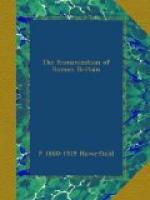I have heard this conclusion doubted on the ground that a bricklayer or domestic servant in a province of the Roman Empire would not have known how to read and write. This doubt really rests on a misconception of the Empire. It is, indeed, akin to the surprise which tourists often exhibit when confronted with Roman remains in an excavation or a museum—a surprise that ‘the Romans’ had boots, or beds, or waterpipes, or fireplaces, or roofs over their heads. There are, in truth, abundant evidences that the labouring man in Roman days knew how to read and write at need, and there is much truth in the remark that in the lands ruled by Rome education was better under the Empire than at any time since its fall till the nineteenth century.
It has, indeed, been suggested by doubters, that these graffiti were written by immigrant Italians, working as labourers or servants in Calleva. The suggestion does not seem probable. Italians certainly emigrated to the provinces in considerable numbers, just as Italians emigrate to-day. But we have seen above that the ancient emigrants were not labourers, as they are to-day. They were traders, or dealers in land, or money-lenders or other ‘well-to-do’ persons. The labourers and servants of Calleva must be sought among the native population, and the graffiti testify that this population wrote Latin. It is a further question whether, besides writing Latin, the Callevan servants and workmen may not also have spoken Celtic. Here direct evidence fails. In the nature of things, we cannot hope for proof of the negative proposition that Celtic was not spoken in Silchester. But all probabilities suggest that it was, at any rate, spoken very little. In the twenty years’ excavation of the site, no Celtic inscription has emerged. Instead, we have proof that the lower classes wrote Latin for all sorts of purposes. Had they known Celtic well, it is hardly credible that they should not have sometimes written in that language, as the Gauls did across the Channel. A Gaulish potter of Roman date could scrawl his name and record, Sacrillos avot, ‘Sacrillus potter’, on the outside of a mould.[1] No such scrawl has ever been found in Britain. The Gauls, again, could invent a special letter Eth to denote a special Celtic sound and keep it in Roman times. No such letter was used in Roman Britain, though it occurs on earlier British coins. This total absence of written Celtic cannot be a mere accident.
[Footnote 1: One example is Sacrillos avot form., suggesting a bilingual sentence such as we find in some Cornish documents of the period when Cornish was definitely giving way to English. Another example, Valens avoti (Dechelette, Vases ceramiques, i. 302), suggests the same stage of development in a different way.]




